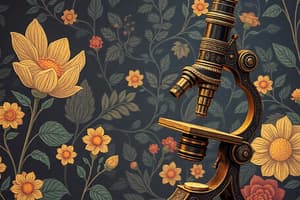Podcast
Questions and Answers
What is another name for the eyepiece of a microscope?
What is another name for the eyepiece of a microscope?
- Condenser lens
- Ocular lens (correct)
- Stage
- Objective lens
What does the arm of a microscope connect?
What does the arm of a microscope connect?
It connects the nosepiece to the rest of the microscope.
What part of the microscope holds the slide being viewed?
What part of the microscope holds the slide being viewed?
Stage
What is the function of the coarse focus on a microscope?
What is the function of the coarse focus on a microscope?
What does the fine focus do on a microscope?
What does the fine focus do on a microscope?
What is the base of a microscope used for?
What is the base of a microscope used for?
What is the purpose of the light source in a microscope?
What is the purpose of the light source in a microscope?
What does the diaphragm regulate?
What does the diaphragm regulate?
What do stage clips do?
What do stage clips do?
What range do the objective lenses on a microscope typically cover?
What range do the objective lenses on a microscope typically cover?
What is another term for the nosepiece of a microscope?
What is another term for the nosepiece of a microscope?
What connects the ocular lens with the objectives?
What connects the ocular lens with the objectives?
Where is the condenser lens located?
Where is the condenser lens located?
Study Notes
Microscope Components
-
Eyepiece: Also referred to as the ocular lens; where the user looks through to view the specimen.
-
Arm: Connects the nosepiece to the body; essential for carrying the microscope safely.
-
Stage: The platform that holds the slide being examined; critical for stability and visibility.
-
Coarse Focus: Mechanism for making significant vertical adjustments to bring the specimen into rough focus.
-
Fine Focus: Allows for precise adjustments to sharpen the image of the specimen after initial focusing.
-
Base: The bottom support structure of the microscope; used in conjunction with the arm for transport.
-
Light Source: Provides illumination for viewing specimens; can consist of a mirror, LED, or light bulb.
-
Diaphragm: Device that controls the amount of light passing through the opening in the stage to enhance visibility.
-
Stage Clips: Clips that secure the slide in position on the stage to prevent movement during observation.
-
Objective Lenses: Lenses mounted on the nosepiece; magnification ranges from 4X to 40X, allowing for various levels of detail.
-
Nosepiece: Rotating component that holds multiple objective lenses; enables quick changes between different magnifications.
-
Body Tube: Connects the eyepiece with the objective lenses; direct pathway for light from the specimen to the observer.
-
Condenser Lens: Placed just below the specimen; focuses light onto the specimen for clearer imaging.
Studying That Suits You
Use AI to generate personalized quizzes and flashcards to suit your learning preferences.
Description
Test your knowledge of the parts of a compound microscope with this quiz. Each question covers a specific component and its function, helping you to better understand how the microscope operates. Perfect for students studying biology or science education.




